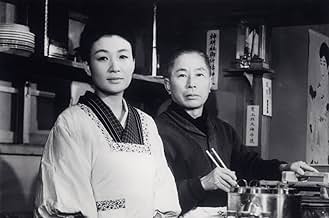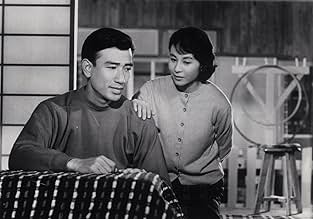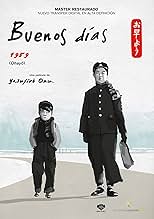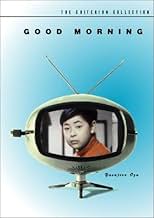Two boys begin a silence strike to press their parents into buying them a television set.Two boys begin a silence strike to press their parents into buying them a television set.Two boys begin a silence strike to press their parents into buying them a television set.
- Director
- Writers
- All cast & crew
- Production, box office & more at IMDbPro
Featured reviews
Ozu said he wanted to make a film about people's inability to express the important things, but natter on about unimportant gossip. This all comes out thanks to two boys that really want a TV. They enter into a vow of silence until their TV comes. This silence is misconstrued by the neighbours, who think their mother is angry at them. They begin to gossip amongst themselves and rumors soon start. Meanwhile, the young boys' aunt and teacher are attracted, but fail to act on their emotions. This is a lovely little film, filled with some great humor. Though, I must admit, there was a bit too much focus on the poo/farts jokes. The two boys, especially the youngest, are very cute and make their efforts to get a TV seem less brattish. It's really sweet to see how dedicated the parents are, and even though the kids are kind of mean, they do appreciate the gift in the end. There's no escaping Ozu's look at the clashes between old and new, with the TV looming over all procedures as something that will change life. A little gem, if not one of Ozu's classics.
"Good Morning," is one of my favorite's films.
It means a lot to me personally, because -like all of Ozu's work- it demonstrates a brilliant understanding of the complexities of being human. It contains simple wisdom, humour, and kindness; and sadly the whole of cinema history has provided us with very few films which can make such a claim. Ozu celebrates the beauty of middle-class existence, all the while delivering a profound criticism of our tendency to permit "small talk" to dominate conversations. Ultimately though, it is the humour which makes "Good Morning" my favorite's Ozu picture, for it is a very funny movie. Very funny and very satisfying! I can hardly imagine an open-minded person not enjoying it.
Because many North American viewers have a reluctance to watch films more than a few years old, or in languages other than English, Ozu's exposure here is still extremely limited. That is unfortunate because Ozu's films are quite universal.
I feel confident that anyone could appreciate Ozu's genius in this film.
It means a lot to me personally, because -like all of Ozu's work- it demonstrates a brilliant understanding of the complexities of being human. It contains simple wisdom, humour, and kindness; and sadly the whole of cinema history has provided us with very few films which can make such a claim. Ozu celebrates the beauty of middle-class existence, all the while delivering a profound criticism of our tendency to permit "small talk" to dominate conversations. Ultimately though, it is the humour which makes "Good Morning" my favorite's Ozu picture, for it is a very funny movie. Very funny and very satisfying! I can hardly imagine an open-minded person not enjoying it.
Because many North American viewers have a reluctance to watch films more than a few years old, or in languages other than English, Ozu's exposure here is still extremely limited. That is unfortunate because Ozu's films are quite universal.
I feel confident that anyone could appreciate Ozu's genius in this film.
"Good Morning" (Japanese, 1959): Directed by Ozu. As in all of his films, Tokyo is the stage, and he populates them with his usual team of actors. Think of the professional stability of Ingmar Bergman, Woody Allen, or John Waters, but Japanese. Ozu concentrates on small moments made meaningful. Unlike the quiet, black and white drama "Tokyo Story", this later film (in color) is a gentle comedy about how people build the character of each and every day with the smallest of gestures which is this case is brought to our attention by two small brothers who decide to go "on strike" insisting that their Father get a television for the household. It's a loving, funny, and forgiving look at how silly we all can be.
In a small community of workers in Japan, two brothers decide to not speak because they want to force their parents to buy a television.
With this single storyline, Japanese director Yasujiro Ozu exposes a delightful and critical view of the behavior of the Japanese working class under the American influence in the post-WWII. Once again the major concern of Ozu is with the family and human relationship. The situation of the retired people is magnificently pictured through the desperate men looking for a job; the domination of the USA in Japan is represented through the need of private English classes for the two brothers, and the translation of documents to English; superfluous consume of the American society is represented through the importance of the useless television for the younger generation, while their parents are concerned with have some savings for their retirement. The destructive little gossips, the difficulties of communication, and many other problems of relationship are also shown in this little gem. For movie lovers like me, I regret to inform that this is the first DVD of the great director released in Brazil. Only in festivals, and occasionally in cable television, Brazilians have the chance to see the work of this great director. My vote is eight.
Title (Brazil): "Bom Dia" ("Good Morning")
With this single storyline, Japanese director Yasujiro Ozu exposes a delightful and critical view of the behavior of the Japanese working class under the American influence in the post-WWII. Once again the major concern of Ozu is with the family and human relationship. The situation of the retired people is magnificently pictured through the desperate men looking for a job; the domination of the USA in Japan is represented through the need of private English classes for the two brothers, and the translation of documents to English; superfluous consume of the American society is represented through the importance of the useless television for the younger generation, while their parents are concerned with have some savings for their retirement. The destructive little gossips, the difficulties of communication, and many other problems of relationship are also shown in this little gem. For movie lovers like me, I regret to inform that this is the first DVD of the great director released in Brazil. Only in festivals, and occasionally in cable television, Brazilians have the chance to see the work of this great director. My vote is eight.
Title (Brazil): "Bom Dia" ("Good Morning")
It may have the skimpiest of plots--two young brothers take a vow of silence until their parents buy them a television--but Yasujiro Ozu's 1959 picture is anything but slight, taking on the subject of language (ironic, considering the story) with attentiveness and intelligence. In his deliberate, contemplative manner, Ozu presents a wry commentary on the ways even the most innocuous words can harm (gossip) or become the building blocks of a relationship (a budding romance is confirmed by a conversation about the weather); he also notes Japan's growing fascination with the English language (the older boy studies it) and the increasing obsession, now with fourteen years of distance from the war, with American technology--the suburban landscape is peppered with aerial antennas as television begins to permeate the culture. It's subtly beautiful: each shot is perfectly framed (the camera never moves) with an excellent use of depth that highlights exactly what the director wants you to see and giving you plenty of space to focus; it's easy to see how a master of today's Asian cinema such as Wong Kar-Wai would be profoundly influenced by Ozu's languid yet carefully observed filmmaking. A delight; it's also a fine introduction for younger viewers to the magnificence of international cinema.
Did you know
- TriviaYasujirô Ozu: [movie posters] Yasujirô Ozu pays tribute to his cinematic influences by putting all kinds of film posters all over the wall in his films. In this movie, there are two posters, one of The Defiant Ones (1958) (at 08:30) and one of The Lovers (1958) (at 08:07), both at the neighbors' house.
- Alternate versionsThe original American theatrical release prints were in black and white.
- ConnectionsFeatured in Transcendental Style and Flatulence (2017)
- How long is Good Morning?Powered by Alexa
Details
- Release date
- Country of origin
- Languages
- Also known as
- Guten Morgen
- Production company
- See more company credits at IMDbPro
Contribute to this page
Suggest an edit or add missing content




























